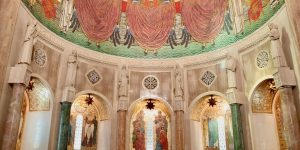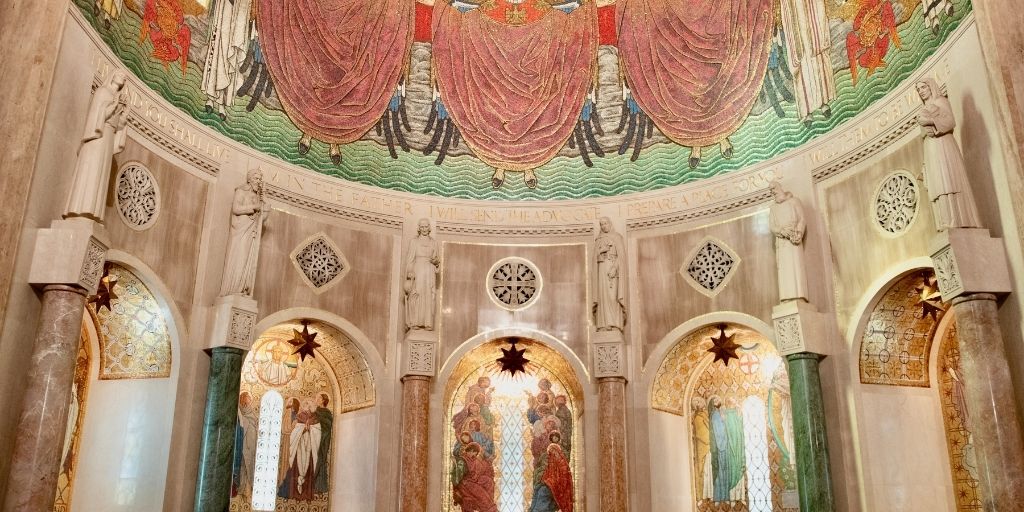
During the month of August, the Church celebrates a variety of saints with feast days and memorials, honoring their unique contributions to the faith and reflecting upon their examples of holiness. From rhetorical giants like Augustine and Dominic, to prayer warriors like Monica and Clare, these saints each have something to teach us. Read about five saints celebrated in August and why you should know their stories.
August 4 – St. John Vianney
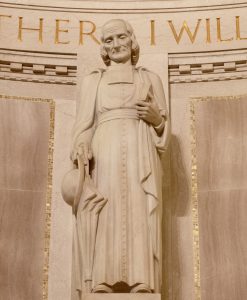
Born to a shepherd-farmer in France in 1786, St. John Vianney began his theological studies at age 20 with Abbé Balley, but shortly after was drafted into the army through a clerical mistake. After falling ill when his battalion was leaving for Spain and staying behind, he lived in hiding with a group of deserters until Napoleon declared general amnesty in 1810. Once he could resume his studies, Vianney enrolled in the seminary at Lyons. There, he struggled greatly with Latin and failed his exams for the priesthood, but his personal devotion was so great that Abbé Balley intervened on his behalf, tutoring him privately until he was ordained in 1815.
Vianney was next sent to work at a rural village called Ars, where he gained such great popularity that people traveled from far and wide to come visit him. In the last 15 years of his life, he spent 12 to 16 hours a day in the confessional and received 300 visitors a day on average. A special train ticket was sold in Lyons specifically for the pilgrimage to Vianney’s parish, and in the final year of his life over 100,000 individuals came to visit him. He was so beloved among the French people that Napoleon sent him the Imperial Order of the Legion of Honor, but he refused to accept it. With a life so dedicated to ministry, Vianney’s own health suffered from overwork, and at age 73, he passed away.
August 8 – St. Dominic
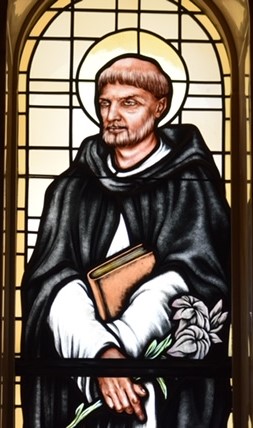
Born to a noble family in Caleruega, Spain, in 1170, St. Dominic set himself apart from his peers with his zeal for understanding the Scriptures and empathetic heart even as a boy. He displayed ascetic tendencies at an early age when he sold off his books to collect funds for the poor.
Once he was ordained a priest, St. Dominic embarked on a diplomatic mission to southern France with the goal of evangelizing unreached rural populations and combating the errant views of the Albigensians, who believed in equal twin forces of good and evil in the world, and associated all material substance with evil. As a result, they denied many critical doctrines including the resurrection of the body and the incarnation of Christ. St. Dominic preached to the Albigensians for years with few converts, as a war raged on between them and the Castilian government. However, one night, Dominic stayed at the house of an Albigensian leader, discussing matters of theology until the Albigensian was persuaded to Dominic’s view. This encounter was formative in shaping St. Dominic’s philosophy of missions.
St. Dominic believed that rational argumentation – and not threats of violence or declarations of dogma – was the proper path to persuading dissenters. It was upon this conviction that he based the Order of Preachers (now known as the Dominican Order) in 1214, committed to the conversion of unbelievers and the re-conversion of non-practicing Catholics, focusing on scholarship, preaching, and spiritual education. At the time of St. Dominic’s passing at age 52 in 1221, the Dominican order had already expanded to sixty friaries across the continents, from Palestine to Scandinavia.
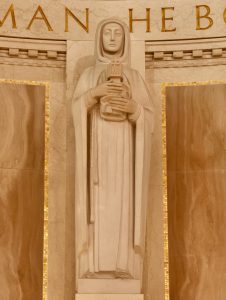
August 11 – St. Clare of Assisi
Born into a wealthy aristocratic family, St. Clare had little knowledge of what it meant to live in poverty. However, at the age of seventeen, she heard a sermon by St. Francis of Assisi which inspired her to leave her life of luxury to become a nun in 1212. Despite her parents’ attempts to forcibly remove her from her new life – including sending a group of a dozen armed guards to retrieve her – Clare remained ever-vigilant in her faith and fled to a different convent. She later founded her own Order, which came to be known as the Poor Clares. Her example had such an impact upon her mother and sister Agnes that they also joined her in holy service, becoming members of the Poor Clares.
In the Order of the Poor Clares, St. Clare and her followers lived by stringent rules – eating no meat, wearing no shoes, and hardly speaking in order to better contemplate Christ, and be “transformed into the image of God.” Clare understood vocation to be a gift from God and urged fellow believers not to underestimate its importance.
St. Clare was 59 when she passed away on August 11, 1253. Now over 750 years later, the Order of the Poor Clares has branches in nearly 900 monasteries across five continents.
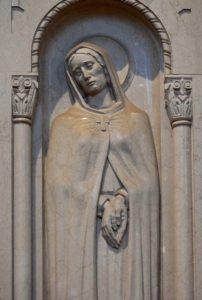
August 27 – St. Monica: The Patron Saint of Mothers
Born in the 4th century, St. Monica is recognized as the patron saint of mothers. After her husband’s premature death, St. Monica dedicated her life to raising her children. As a single mother of three, she persevered in the face of many difficulties. Her greatest desire was for her children to follow Christ. Although later in life he was known as a fervent man of God, St. Augustine did not easily come to see God’s truth. As a child, he proved to be quite difficult, causing Monica much grief, and as a young adult he remained uninterested in Christianity. But St. Monica never stopped praying for his eternal soul, in spite of the circumstances. On one occasion, when she was discussing the matter with a priest, he urged her to remain steadfast in her prayers, stating that it was “not possible that the son of so many tears should perish.”
After many years of prayer, St. Monica finally saw her son give his life to the service of God. St. Augustine declared that his mother’s resilience and dedication to prayer is what led him to become the man of God he was meant to be. He stated that St. Monica was not only his mother, but “the source of his Christianity.” St. Monica passed away in A.D. 387, shortly after St. Augustine was baptized. Her legacy serves as a reminder for all Christians to never stop praying for those who do not yet know Christ.
August 28 – St. Augustine
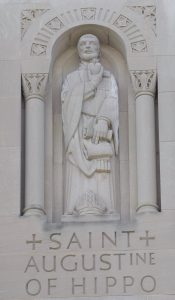
St. Augustine was born in northern Africa in 354. Despite being raised by a devoted Christian mother, he was a difficult child, and grew to be an atheist. A highly intelligent scholar who had received the finest education, he founded a school of rhetoric in Rome in 383. However, dissatisfied with the city, he moved to Milan in a year’s time. It was there he met the bishop St. Ambrose, who was a convincing orator with a formidable command of rhetoric. His skill and integrity had a particular impression on Augustine and were instrumental in his conversion.
Augustine’s mother, Monica, also prayed unyieldingly for his redemption, and in 387, her prayers were answered: one day while he was in the garden, he heard a child chanting, “Take up and read! Take up and read!” Feeling a divine nudge, Augustine opened a Bible and read in Romans an exhortation to abandon licentiousness and follow Christ. Following the passing of his mother, Augustine returned to North Africa, and founded a religious order in Tagaste. He later was ordained, and in 395, became bishop of Hippo.
Not only did Augustine have a significant impact on Christianity, but on Western culture and philosophy more broadly. By some accounts, his Confessions is considered the first autobiography of the West, and is perhaps the “most widely read book of Christian antiquity.” The sheer volume of writings Augustine produced in his lifetime is staggering, including an estimated 3,000 letters and homilies, as well as an additional 1,000 other publications of significant philosophical and theological depth.
Sources:
Butler’s Lives of Saints, ed. Bernard Bangley
The Way of Saints, by Tom Cowan

